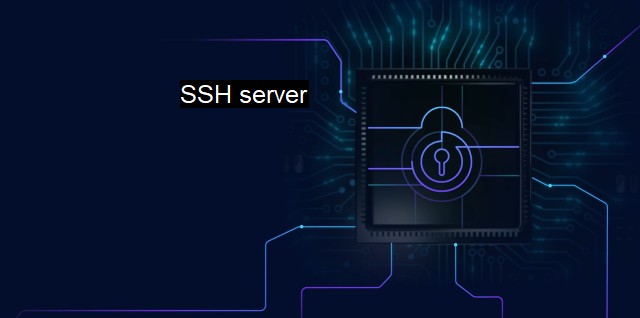What is SSH server?
Secure and Encrypted Network Communication: A Guide on SSH Protocol for Remote Server Access and Cybersecurity
An SSH server refers to a program that utilizes the Secure Shell protocol to accept connections from remote computers. SSH, or Secure Shell, is a cryptographic network protocol produced for secure data communication on an unprotected network. Typically, SSH servers are leveraged in several capacities that require secure communication over an unsecured network. system administrators may use SSH servers to securely access and manage systems regardless of their physical location. This capability is a beneficial factor that has contributed substantially to SSH's ubiquity in the networking and cybersecurity world.The application of SSH servers is not solely restricted to systems administration. SSH servers are also essential in safeguarding data being transferred over the internet. SSH typically provides strong password authentication and secure encrypted data communication between two computers connecting over an open network, thus securing potentially sensitive data from hackers and eavesdroppers who might otherwise have easy access to unsecured data.
SSH server facilitates the encryption of data, protecting it in transit from potential prying eyes. This server-side encryption complements client-side encryption methods that are often used by antivirus programs to secure stored data. Antivirus software serves another essential role in cybersecurity; it scans, detects, and eliminates malicious software on a device. While the SSH server upholds secure network connections, antivirus software helps to ensure that potential threats aren't taking up residence in the network-attached systems.
Notably, SSH servers support a vast array of encryption algorithms, including AES, 3DES, and Blowfish. These encryption techniques provide bitwise encryption of the payload being transported, guaranteeing that the data cannot be intercepted and deciphered by attackers during transit. This protocol also provides an added layer of antivirus protection by ensuring that transferred files are neither intercepted nor tampered with during transit.
The SSH server isn't simply a client-server protocol. It provides functionalities such as secure remote logging, secure file transfer, and secure command execution. It's essential to understand that even though SSH servers sound impressively secure, they are not entirely immune to attacks. Attackers often exploit weak configurations and security loopholes within the SSH servers by launching various types of attacks such as brute force attacks, man-in-the-middle attacks, and denial-of-service attacks.
As a mitigation strategy, SSH keys can be employed instead of traditional passwords for authentication. SSH keys are long, random sequences of characters that form a cryptographic pair: a private key and public key. They provide a level of security that exceeds complex, multi-character passwords, making your digital assets significantly harder to compromise.
Notwithstanding its robustness, an SSH server's effectiveness is not solely reliant on its inherent security features. Its complementarity with antivirus systems contributes substantially to its robustness. By using digital signatures to verify their identities, computers and devices can establish trust while using the SSH protocol, reducing their susceptibility to spoofing attacks. Conversely, antivirus systems secure endpoints by detecting and mitigifying threats from malware, viruses, and spyware.
An SSH server, integrated with robust antivirus mechanisms, creates a secure digital environment that can resist various spectrum of cyber threats. Their role within cybersecurity highlights the need for sufficient protection across network communications and digital assets. As no system is entirely immune from the evolving threats of hackers, employing both SSH servers and antivirus software offers the best form of multi-layered protection with secure networking capabilities and sufficient endpoint defenses.

SSH server FAQs
What is an SSH server and why is it important for cybersecurity and antivirus?
An SSH server is a secure way for users to access and manage a remote machine. It uses encryption to protect the data that is transmitted between the user and the remote machine, making it a valuable tool for cybersecurity. In antivirus, SSH servers can be used to remotely administer antivirus software and troubleshoot malware infections.How do I set up an SSH server for my cybersecurity needs?
Setting up an SSH server can vary depending on your operating system and network setup, but most operating systems have built-in support for SSH. Simply turn on the SSH server and configure the necessary settings to restrict access and improve security. It's recommended to use public key authentication and configure a firewall to only allow trusted IPs to access the server.Can an SSH server be compromised by malware or cyber attacks?
While SSH servers are inherently secure, they can still be vulnerable to cyber attacks if not properly secured. Common attacks include brute force password cracking and man-in-the-middle attacks. Ensure that you have strong passwords and configure your server to use public key authentication instead. It's also important to keep your system and SSH server up to date with the latest security patches.Are there any best practices to follow when using an SSH server for antivirus software management?
Yes, some best practices include using public key authentication to prevent unauthorized access, configuring a firewall to restrict access to trusted IP addresses, and regularly monitoring server logs for any suspicious activity. It's also important to ensure that antivirus software is kept up to date and configured correctly to effectively detect and remove malware.| | A | | | B | | | C | | | D | | | E | | | F | | | G | | | H | | | I | | | J | | | K | | | L | | | M | |
| | N | | | O | | | P | | | Q | | | R | | | S | | | T | | | U | | | V | | | W | | | X | | | Y | | | Z | |
| | 1 | | | 2 | | | 3 | | | 4 | | | 7 | | | 8 | | |||||||